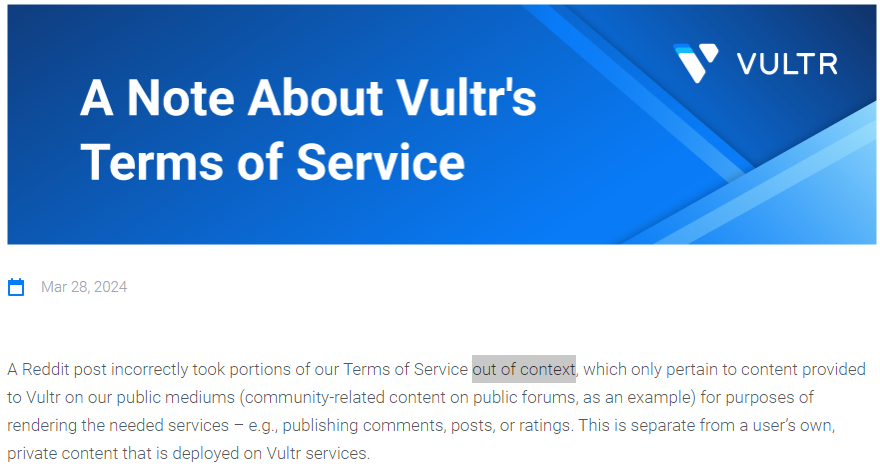
Breaking Free: Why I’m Ditching Vultr and Moving My Sites Elsewhere
Let’s cut straight to the chase: Vultr has royally screwed up, and I’m not mincing words here. I don’t give a damn about their policy reversal or any apologies from the CEO. The damage is done, and it’s irreparable.
What they’ve done is unforgivable. They’ve shattered the trust of countless businesses and website owners, including mine. If you’re even considering Vultr for your hosting needs, think again.
Now, let’s delve into what exactly went down to cause such outrage against the company.
Vultr blindsided its users with a sudden update to their Terms of Service to say the following:
You hereby grant to Vultr a non-exclusive, perpetual, irrevocable, royalty-free, fully paid-up, worldwide license (including the right to sublicense through multiple tiers) to use, reproduce, process, adapt, publicly perform, publicly display, modify, prepare derivative works, publish, transmit and distribute each of your User Content, or any portion thereof, in any form, medium or distribution method now known or hereafter existing, known or developed, and otherwise use and commercialize the User Content in any way that Vultr deems appropriate, without any further consent, notice and/or compensation to you or to any third parties, for purposes of providing the services to you.
It’s deeply troubling for any hosting or cloud provider company to assert ownership over customer data in its Terms of Service. This practice raises serious concerns as it grants the company unrestricted rights to utilize that data for various purposes. Whether it’s for training AI algorithms or other undisclosed uses, the implications are significant.
Consider a scenario where a website pledges in its Privacy Policy not to utilize customer data for other purposes. With Vultr’s updated TOS, however, they assert rights over that same data, potentially conflicting with the website’s privacy commitments and exposing it to legal complexities.
Vultr defined “User Content” as the following in the updated TOS:
the information, text, opinions, messages, comments, audio visual works, motion pictures, photographs, animation, videos, graphics, sounds, music, software, apps, and any other content or material that you or your end users submit, upload, post, host, store, or otherwise make available
While it’s a positive step that the Vultr TOS defined “User Content,” outlining its scope and nature, it’s alarming when juxtaposed with the problematic ownership claim detailed earlier.
Back in 2023, the changes to the TOS slipped under the radar for most users, as few bother to delve into the legal fine print. Unfortunately, this lack of scrutiny can be detrimental, especially for businesses. Although some users did take the time to review the TOS, the platform requires agreement before accessing its services, leaving little choice but to accept the updated terms. This inherent requirement poses its own set of problems, effectively binding users to the new conditions upon continued use of Vultr’s backend services.
Several months later, observant users caught wind of the modifications and raised concerns on platforms like Reddit. Their decision to voice grievances on Reddit is understandable, given recent experiences where Vultr’s support team demonstrated a stark departure from their previously helpful demeanor. Faced with unhelpful responses, Reddit likely served as the last resort for users seeking acknowledgment and resolution.
When users, including myself, initially reached out to Customer Support to voice our concerns, we were met with evasive responses. I found myself unable to utilize the backend tools to transfer my websites to another provider without first accepting the new TOS. However, I found the terms so objectionable that I refused to agree to them for this purpose. Despite our objections, Vultr appeared indifferent, and the support staff grew increasingly rude, insisting they were ‘legally in the clear’ to enact these changes. They maintained that agreeing to the new TOS was a prerequisite for accessing the backend dashboard, even if our intent was to migrate elsewhere.
Doesn’t this strike you as utterly unacceptable? The language in the TOS explicitly states that it is perpetual and irrevocable. In other words, by agreeing, Vultr would gain unfettered access to our data indefinitely.
Machine learning applications leveraging the data stored on my server? Permitted.
Extraction of personally identifiable information (PII) for resale? Permitted.
Unauthorized appropriation of content for use on a rebranded platform? Permitted.
Until recently, I hadn’t considered that Vultr would engage in such practices, given my positive experiences with them in the past. However, the abrupt shift in their support’s demeanor regarding the TOS change, coupled with a prior incident where blame was shifted onto me for a system-related issue, has revealed a concerning shift within the company’s culture. It seems that as Vultr has grown in size, their true intentions are beginning to surface.
To exacerbate matters, accessing support through the backend became nearly impossible without first accepting the updated Terms of Service (TOS). Alternatively, users had to resort to email, resulting in slower responses, lack of account tie-ins, and increased difficulty.
It appeared that Vultr was intentionally making it challenging for users to opt out of the new terms, emphasizing their desire for widespread acceptance.
Furthermore, these TOS alterations were implemented prior to Vultr prompting users to accept them. Although typical of many platforms, where TOS changes can occur without explicit notification and users implicitly agree by continuing usage, the sudden prompt prompted many to scrutinize recent changes.
The CEO’s response to user concerns only fueled dissatisfaction, with some perceiving him as dismissive. The company’s assertion that Reddit users misrepresented the TOS update lacks substantiation, as the actual TOS alterations were clear and not taken out of context.

Caught in the backlash, Vultr sought to mitigate damage through a statement in late March, but the attempt seemed more like damage control than a genuine resolution.

Rather than taking responsibility for their mistake, Vultr opted for excuses like claiming the situation was “out of context” and condescendingly asserting that the “average user doesn’t have a law degree,” as directly quoted by the CEO to The Register.
No shit, Sherlock! It seems like your legal team isn’t exactly top-notch either, though.
The company hastened to clarify that the newly added sections of the Terms of Service (TOS) pertained only to community-related content on forums and similar platforms. However, this assertion is misleading.
Although these sections were placed under “12. User Content,” they had already defined user content earlier. Furthermore, the statement concluded with “for purposes of providing the Services to you,” which is a notably broad assertion. Vultr offers a range of services beyond just community-generated content. By leaving this statement vague, it appears they intended to obscure the true extent of the changes.

Vultr was eager to emphasize the significance of the last line in their recent statement.
Look, I’m not a lawyer, and I won’t pretend to be one, unlike the abrasive CEO of Vultr, who seems keen on reminding users of their non-lawyer status. However, it appears this statement only complicates matters further. Vultr offers various services, not just community-focused ones, and it seems they’re intentionally blurring the lines here to justify their actions while discrediting users who raised legitimate concerns.
Even if we were to entertain the notion that this was taken out of context, the fact remains that these decisions were greenlit by their legal team, the CEO’s disrespectful behavior towards users, and their subsequent clarification—all of which were delivered with a noticeable disdain for users who simply took the time to read the Terms of Service—only diminishes my trust in this company even further.
Instead of acknowledging their mistake directly, they chose to engage in arguments with users who had taken the time to read the Terms of Service (TOS). They could have easily implemented separate Terms of Service agreements for specific features like forums and community-generated content, allowing users to agree to them selectively and preventing any potential confusion. However, they opted to consolidate everything into one agreement, forcefully imposing it on users and making it increasingly challenging to opt out.
It’s astonishing to think that in today’s world, end users may need to consider embedding unique hashes within their content, specifically tied to what they’ve generated, and then running various AI prompts to detect any unauthorized use of their data. Yet, unfortunately, this is the reality we’re faced with.
Even more concerning is the possibility that some companies may have already sold your data to an AI provider, exploiting permissions you may not have been fully aware of. Let me be clear—I’m not opposed to AI or large language models (LLMs); in fact, I frequently benefit from their capabilities. However, if companies are utilizing your data to train these systems, you should have the right to know about it and the option to opt out. Opting out shouldn’t be a cumbersome process; it should be straightforward and effortless.
I don’t necessarily object to the use of my data, as long as I’m informed and retain the right to withdraw consent at any time. However, in some cases, it feels more akin to the situation described in “Hotel California”—you can check out anytime you like, but you can never leave.
Let’s be frank here—while the issue with the Terms of Service wasn’t the primary reason for my decision to leave or to write this post, it was the final straw in a series of disappointments. Recent support experiences, combined with recurring problems unique to Vultr and absent in other cloud providers I use, have been pushing me towards considering a move for some time. Despite being a long-time customer, I’ve given them numerous opportunities to mend the relationship, but instead, they’ve only exacerbated it.
CEOs should stick to their lane and leave legal matters to the experts. Disparaging users and deflecting blame onto them is a short-sighted approach that will inevitably lead to a mass exodus once people catch on to your company’s true colors and operational style.